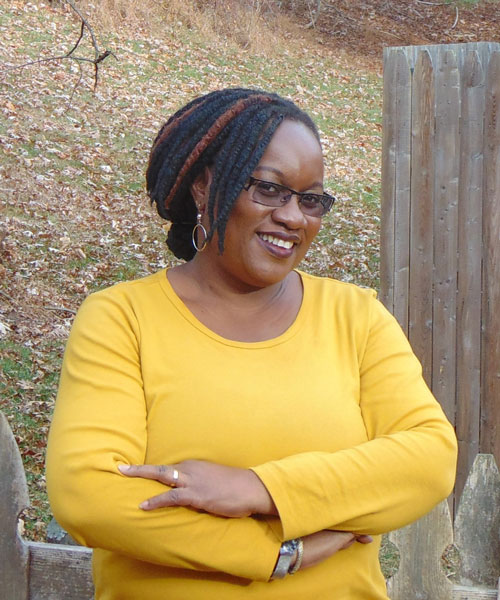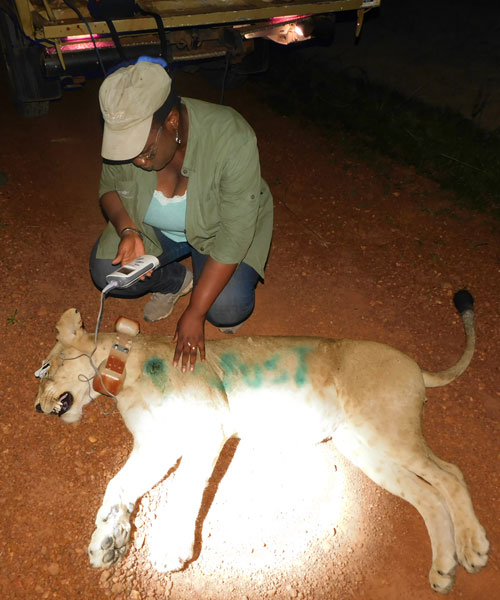Etotépé A. Sogbohossou, a Beninese researcher and lecturer from the University of Abomey-Calavi, Benin, has won the 2019 TWAS-Samira Omar Innovation for Sustainability Award. She receives the award for her awareness raising efforts to help the conservation of large carnivores in West Africa, and for inspiring new generations to protect nature.
Northern Benin hosts a few lion colonies in a transboundary area called WAP (W-Arly-Pendjari) ecosystem, which also includes protected areas of Burkina Faso and Niger. But despite their low density, lions' cohabitation with humans is not easy. Humans are putting pressure on the lands, leading to territory fragmentation and habitat destruction. Meanwhile, lions cause losses in livestock during raids on neighbouring villages.
"Such a conflict is a major threat to local lions' packs: mitigating friction and teaching local communitites the importance of sustainable use of natural resources is becoming more and more urgent," explained Sogbohossou, who works in her university’s school of natural resources management and faculty of agricultural sciences.
Sogbohossou has been working on wildlife conservation for almost two decades, conducting scientific research on wild lions and using her results to develop projects to raise awareness among local communities. She obtained her PhD in conservation biology from the University of Leiden, the Netherlands, in 2011, and is one of the pioneers in the study of lions in West and Central Africa since her research was the first important investigation of its kind in this area, paving the way for further studies on large carnivores.
In 2012-2013, Sogbohossou played an active role in monitoring elephant and giraffe populations and their conflicts with local communities, working as an ecologist for the African Wildlife Foundation in the WAP. She then, more recently, acquired her current role at the faculty of agricultural sciences of the University of Abomey-Calavi.
Large carnivores are among the most threatened species on Earth because of their ecological requirements such as water and food, and because of the diverse ways humans exploit the local wildlife – killing lions for trophies, or as retaliation when lions kill cattle and other livestock.
"At times, poachers kill lions because they want to sell parts of their body for medical or even magical use, because some people think they can become as powerful as the animal they killed," explained Sogbohossou.
"But despite their threatening appearance, lions are extremely vulnerable," added Sogbohossou, who is also a TWAS Young Affiliate (2018-2022) and an active member of the African Lion Working Group as well as of several commissions and groups of specialists of The International Union for Conservation of Nature (IUCN). "Exponential population growth is forcing humans to come in closer proximity with lions, and even if these felines live in a reserve surrounded by a buffer zone devised to minimize conflicts, contacts may be frequent."
In her studies, Sogbohossou found that livestock predation follows a seasonal pattern. Lions, in general, prey more on livestock in the late wet season, perhaps because livestock tend to scatter far from villages and natural prey are more difficult to hunt during the wet season. Other factors influencing the livestock depredation are the proximity to the reserve and the presence of safari hunting.
"Man-lion conflicts can be reduced also by improving husbandry practices," Sogbohossou noted. "By changing herding practices and building predator-proof enclosures, local people would increase their chances to protect cattle from lions." The new Pendjari park management is building a fence that is expected to reduce man-lion conflicts and also lion and wildlife habitat encroachment.
She has worked with the Wildlife Office and local communities. These days she focused on teaching and training the new generation of conservationists.
In another field of investigation, Sogbohossou contributed to studies on lion genetics throughout Africa that found that Benin lion, as West African lions, are genetically different from lions in East and South Africa. This outcome is relevant, because when talking about conservation it is important to know that all species must be protected to preserve biodiversity.
Receiving the TWAS-Samira Omar Award was an unexpected development for Sogbohossou. "I did not imagine I would win this award," she said "but I already know how I will use it. I would like to focus on education and use research results to raise awareness among policy makers and decision makers.
And she added: "In 2019, lions’ experts under the leadership of Disney Foundation and the Lion Recovery Fund promised through a declaration to recover lions, to work and unlock their value. This will be my contribution to it. The award could also help to buy a few pieces of equipment such cameras for a wildlife survey. In addition, as it is not always easy to get funding, I hope it will serve as leverage to get more financial support for our battle against the endagerment of Earth's resources."
Cristina Serra

